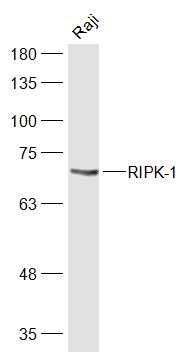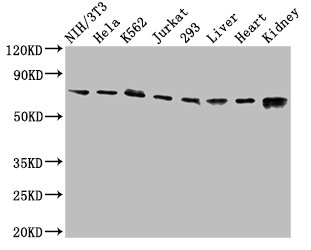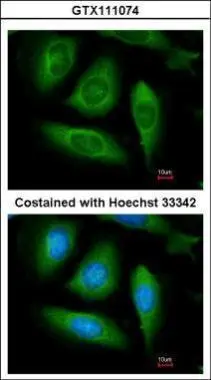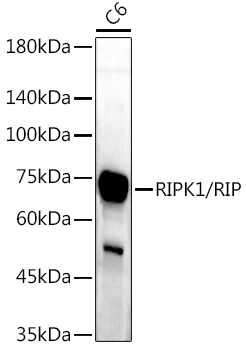RIPK1 Polyclonal Antibody
RD218284A
ApplicationsWestern Blot, ELISA, ImmunoHistoChemistry
Product group Antibodies
ReactivityHuman
TargetRIPK1
Overview
- SupplierReddot Biotech
- Product NameRIPK1 Polyclonal Antibody
- Delivery Days Customer5
- ApplicationsWestern Blot, ELISA, ImmunoHistoChemistry
- CertificationResearch Use Only
- ClonalityPolyclonal
- Concentration0.7 mg/ml
- ConjugateUnconjugated
- Gene ID8737
- Target nameRIPK1
- Target descriptionreceptor interacting serine/threonine kinase 1
- Target synonymsAIEFL, IMD57, RIP, RIP-1, RIP1, receptor-interacting serine/threonine-protein kinase 1, cell death protein RIP, receptor (TNFRSF)-interacting serine-threonine kinase 1, receptor-interacting protein 1, receptor-interacting protein kinase 1, serine/threonine-protein kinase RIP
- HostRabbit
- IsotypeIgG
- Scientific DescriptionSerine-threonine kinase which transduces inflammatory and cell-death signals (programmed necrosis) following death receptors ligation, activation of pathogen recognition receptors (PRRs), and DNA damage. Upon activation of TNFR1 by the TNF-alpha family cytokines, TRADD and TRAF2 are recruited to the receptor. Phosphorylates DAB2IP at Ser-728 in a TNF-alpha-dependent manner, and thereby activates the MAP3K5-JNK apoptotic cascade. Ubiquitination by TRAF2 via Lys-63-link chains acts as a critical enhancer of communication with downstream signal transducers in the mitogen-activated protein kinase pathway and the NF-kappa-B pathway, which in turn mediate downstream events including the activation of genes encoding inflammatory molecules. Polyubiquitinated protein binds to IKBKG/NEMO, the regulatory subunit of the IKK complex, a critical event for NF-kappa-B activation. Interaction with other cellular RHIM-containing adapters initiates gene activation and cell death. RIPK1 and RIPK3 association, in particular, forms a necrosis-inducing complex.
- ReactivityHuman
- Storage Instruction-20°C
- UNSPSC12352203







